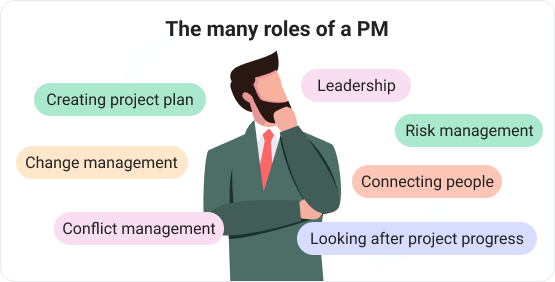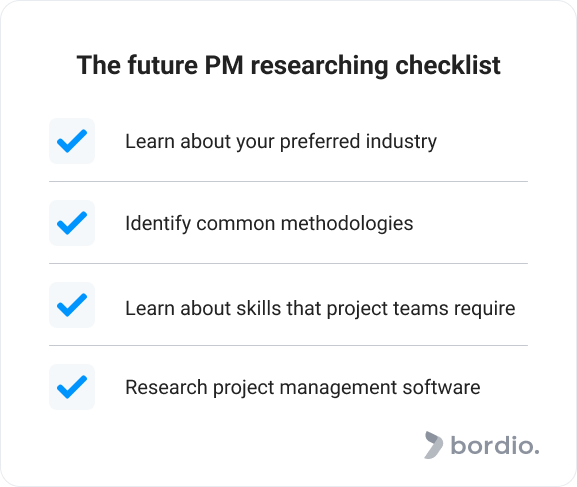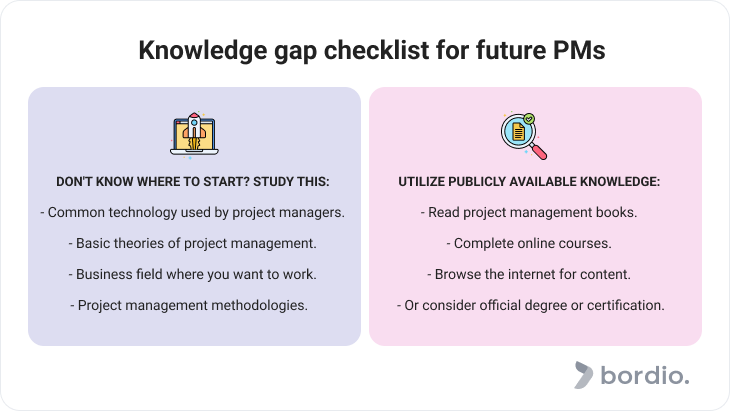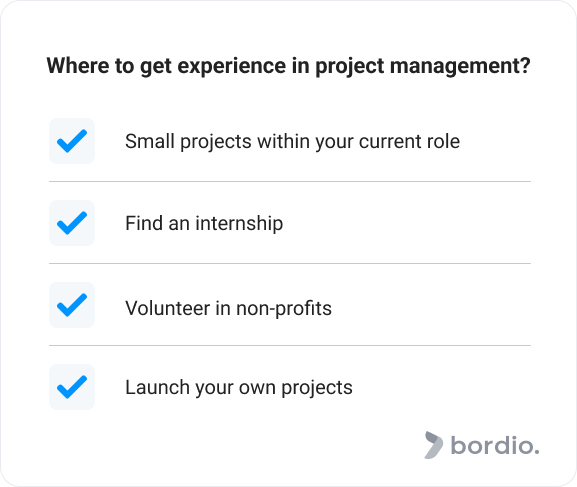Over the course of the past decade, the role of a project manager (PM) has shifted and become very desirable.
The perception of what it means to be a project manager is very flexible and adaptive. Some tasks that you are expected to work on in your current project might be irrelevant in the next endeavor.
Project managers rarely get bored as they are always required to learn new things, practice new tools, and find creative ways out of unpredictable situations. This makes the role extremely challenging but also exciting. One of the common complaints of modern employees is feeling like they’re not contributing anything meaningful and instead are forced to do repetitive tasks. If you choose project management as your career path, there is almost a guarantee this won’t happen to you.
Anyone can become a project manager if they really want to. But it doesn’t mean that it will be easy! Our action plan will guide you and provide context on how to start with managing projects and succeed.
What is a project manager?
The project manager is someone who is responsible for the project from its ideation to final delivery.
Project managers are like chameleons. Their full list of project management roles and responsibilities adapts and changes to fit into the environment. Still, there are similarities and some of the tasks assigned to PMs are more common than the others.
Here are the most common responsibilities that many project managers have:
- Creating a project implementation plan from start to finish in the best task planner.
- Monitoring the entire project progress.
- Coordinating and connecting people.
- Leadership, motivation, and management of the team.
- Change management: dealing with changes fast and with the best results.
- Risk management: combating risks proactively and reactively.
- Stakeholder and customer satisfaction.
- Final product presentation and approval.
- Post-delivery paperwork: writing reports and logging all data.
And the list goes on! If you’d like to learn more, check out our top project manager roles and responsibilities article in the blog.
So how do you become a project manager?
If you’re not sure where to start your project management career path, start in the beginning!
We prepared a list of action steps below to help you go through all the basics. You will end up with a clear understanding of where you want to go and the necessary skills to get you there.
Step 1. Figure out which industry you want to work in
Project management only seems universal. In reality, every industry has its own nuances and rules. So, the best start of your project management career is to understand where you see yourself working. Should it be information technology? Maybe you are passionate about charity work and want to dive deeper in it?
It’s okay if you are not 100% sure where you want to go at this point. However, we strongly encourage you to do a brainstorming session, create a list, and get a rough idea. Many decisions down the line will depend on the field where you want to work, so it will be easier for you to get that understanding early.
Step 2. Do your research
The next step is to explore and research the industries of your choice to gather more data and insight on how project management works there.
Learn about the industries you work in. A good project manager holds tons of knowledge about field-related dynamics. It might not seem like a big deal but such insight allows us to prevent or minimize risks, save time and costs, and avoid common errors.
Identify and get acquainted with the most common project management methodologies, e,g. Agile, Scrum, Lean, and Waterfall in your chosen industries. While it’s not universally true, a lot of industries have their own standard and only work with certain frameworks. For example, IT prefers Agile and Scrum, and you will hardly ever see software developers apply Waterfall project management principles.
Get a basic understanding of skills that are required for the project team that you will be managing. Say you want to be a project manager in information technology. Surely, you don’t need to become a coder and master Python, but it will make your professional life easier if you understand it on a high level. You can also use some auxiliary software like work management tools.
Get acquainted with various project management software. Ask around what people are using, test it out, get a feel for the functionality and opportunities it gives you. The right tools can make the process that much easier and more straightforward. Tools like Bordio’s online calendar planner, that can help you to build your schedule, for example, offer workload tracking, extensive notes, Waiting list for all unscheduled tasks, and so much more. Also Bordio has handy time planners and of course digital daily planners. All that functionality allows project managers to be more efficient and achieve best results.
Step 3. Fill in the knowledge gaps
Now is the time to dig deeper into what you’ve learned about in step 2.
Of course, you can learn on the go once you’ve already started the job. But it will help you immensely to step into the project manager position having a more comprehensive understanding of what you are doing.
Here you have a choice of the route you can take:
- Get one of the formal project management degrees from the university.
- Acquire project management education through books, courses, videos, and experience.
Both routes are possible and none is better than the other. A university degree will give you profound theoretical knowledge and will probably help you advance in your career faster once you start working. It will, though, take a substantial amount of time and resources, so you need to calculate your individual opportunity costs here.
Pro tip 1: Before you commit to a formal project management education, get a chance to experience project management in real life. Even if it’s a one-week internship only, the insight you will get during this time will make your learning process that much easier.
Pro tip 2: A slightly less time-consuming but still formal education option would be getting official project management certification from places like Project Management Institute (PMI) which takes less time than a degree but would still require investment in finances, time, and effort.
Informal education is not as prestigious but it has many other benefits. It’s usually more flexible and up to date, making it more relevant for fast-paced ever-changing fields like project management.
Some of the best ways to get informal education for project managers are:
-
Books from the experts. There are tons of great books out there that provide a general overview or go deep into specific subtopics. Check out our top list of project management books to find a good read for you.
-
Online courses. Online learning platforms like Coursera and Udemy offer a wide variety of courses, some of which are free and some are paid-for. Most of the time, they are taught by experienced project managers, so you get tons of real-life examples along with lectures.
-
Internet in general. Youtube, knowledgeable articles in people’s blogs, publicly shared business cases, – all that serve as great educational materials.
-
Learning through work. We will talk about it more in a second, but learning project management at your workplace is another great way to get hands-on knowledge.
So, as a start, pick up the route you prefer and learn about:
- Basic theories of project management.
- Business operations in the industry or field where you want to work.
- Main project management methodologies that are used in those industries.
- Popular project management software and day planner tools that PMs praise and use. Also task organizer online and time organizers by Bordio are also really useful for project managers.
Once you’ve figured out the basics, you will feel more confident and also have a better idea of where exactly you want to go and what you would like to do there.
But education doesn’t end here! A good project manager knows a lot about:
- Time management
- Risk management
- Change management
- Effective communication skills
- Organizational skills
- Analytical and strategic thinking
So don’t focus too much on project management skills as such. Look for knowledge on business operations in general, leadership skills, process optimization, etc.
Pro tip: Look for internal learning opportunities. Depending on your company, you might be eligible for some courses, training, or even a degree paid by the employer. See if they can cover some or all expenses and make sure you take advantage of those benefits.
Project managers are jacks of all trades, so the learning never stops really.
Ps – if you want to learn more in shorter timeframes, check out the guide on learning faster for helpful tips and tricks.
Step 4. Get that work experience!
Getting a profound theoretical background will likely give you a head start and help progress with your career faster. Still, project management is all about doing and practicing.
Whether you combine steps 3 and 4 or decide to study first and work later, is up to you. But the more work experience you get in the early days, the better understanding of real-life project management you will get. It’s like jumping with a parachute – you can read about it all you want, but you won’t really understand it until you’ve jumped.
By the way, not every project manager has that job title. It is possible that you’ve already been managing projects without realizing it. Perhaps you were curating a new website launch or looked over the integration of a new company-wide CRM system? Well, that’s project management right there!
Now let’s talk about four common routes to get the project management experience for beginners.
Route 1: Take on projects within your current role
If your goal is to get hired as a project manager officially, and you are currently employed for a different role, then the best thing you can do is take on the mini-projects within your current position. Volunteer whenever you can! While you will not get 100% project management experience, you will learn a lot about the specifics of the role and the nuances that you should be aware of. Trust us, the little projects in your department have much more in common with big projects than you think. And the project management skills you need for both are pretty similar!
Route 2: Go back to interning
If you have the time and resources, do an internship. Don’t worry about being assigned the most basic and mundane tasks as an intern. You need to understand all steps of the process to become a brilliant project manager, so any experience you get is invaluable.
Professionals with many years of experience behind them who want to change careers sometimes look down on entry-level internships and consider themselves too good to be an intern. We want to warn you about the dangers of such a mindset. Successful project managers are not afraid to get their hands dirty. Often, they will be covering for whoever needs it in the team, meaning that their digital weekly planners are filled with basic and sometimes plain boring tasks. It is even more difficult for those who work remotely using, for example, collaborative tools for remote working – their routine can be even more boring.
So, if your primary motivation to join project management is prestige, then you might be unpleasantly surprised at some point.
Route 3: Volunteer for a good cause
An alternative way to get the experience as a project manager is to volunteer in your local non-profits and work on little projects that will make your community better and simultaneously will add a case to your portfolio.
Project management challenges are universal and you will definitely get relevant work experience while helping your organization of choice.
And, as a bonus, your future employers will most likely appreciate your passion for doing good along with exercising project management skills.
Route 4: Create and launch your own project
The fourth route is to launch your own little project independently. A mini computer game developed under your curation, a small event organized, a side-hustle where you create and launch a product, – all those things will teach you and help you learn the practicalities of the project management process.
Step 5: Find a mentor
Find an experienced project manager who will agree to be your mentor.
Talking to real people about project management is not the same as reading a book or an article online. Ideally, find someone who lives in your area and works in a similar field. Maybe you have someone in your company who seems fit? Even better!
Finding a mentor can be tricky, partially because of the heavy workload that project managers constantly struggle with. In return for their help, offer to take over some of their project tasks. It will be a win-win situation where you get some project management experience and your mentor will have time to breathe.
Pro tip: Look for mentors who will point out your mistakes so you can correct them early. Just getting encouragement and pats on the back is good for the ego but not enough to progress with your project manager career path.
Step 6: get the word out
Not every project management opportunity becomes publicly available. Start talking about wanting to get a project manager job to your network of people. Especially in the beginning, when your experience and knowledge are not that wide, getting a project management job offered by someone you know might be your best shot.
Pro tip: As you get the word out, work on expanding your network at the same time. Attend relevant events, join communities, come to project manager meet-ups. You never know where the next opportunity is, so don’t limit yourself and be proactive.
Final thoughts on becoming a project manager
The role of project management professional is very fun but also difficult:
- Learn about the field where you want to manage projects to feel more confident.
- Figure out your project management education path.
- Try to get as much practical experience as possible and take every opportunity to manage projects.
- Play and get familiar with various project management software.
- Find a mentor to guide your project management career path.
- Talk about your plans and desires with everyone you know and grow your network.
- Learn to manage a challenging online to-do list with multiple day priorities.
We hope that the knowledge we’ve shared today will help you navigate your project management journey better, and get to your end goal sooner.
Remember that every project management career path is unique. Never stop learning, and don’t worry too much if you’re not showing the best results in one of your endeavors. We learn as we do, and as long as you keep your mindset positive and work ethics strong, your project management skills will get better and you will succeed as a project manager.








